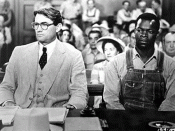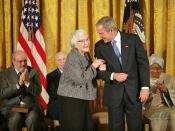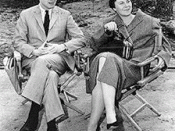Aristotle once said "the law is reason free from passion" and Harper Lee's To Kill a Mockingbird tells the story of what happens when the two are introduced, at the expense of justice. The purpose of all laws is, supposedly, justice: the force of sound reason and fairness. The trial court system is the global standard of fairness, but in the novel, it fails to deliver justice to the town of Macomb. The novel illustrates the failures of the American justice system while still acknowledging it as the best available method of determining truth and maintaining freedom.
"A court is only as sound as its jury, and a jury is only as sound as the men who make it up." [p. 233], and the men who make up the juries of Macomb County are the same men who walk the streets of Macomb: a "tired old town" with some pretty tired and intolerant ideas about racial equality.
The bigotry and personal prejudices of jurors corrupts the justice system, perhaps because they are a form of that passion that confounds reason and the pursuit of truth.
The idea of social justice becomes skewed when that social justice is a reflection of the society that pronounces it. When a student in Scout Finch's class asks the teacher why Nazi Germany's "justice" system didn't try to stop Hitler from carrying out the slaughter of millions of Jews the teacher tells the child, "Hitler is the government." [p. 280] Democratic justice is not justice at all, but merely a reflection of the social and political climate, yet democracy is an integral part of abating tyranny.
The issue of race inexplicably stirs up passion in some individuals. When Atticus Finch tells the jury that the case against Tom Robinson (a black man accused of the...


